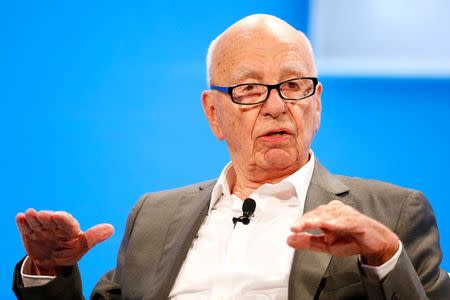Exclusive - Top Fox investors seek to convert voting shares, Murdoch may benefit: sources
By Nadia Damouni and Liana B. Baker NEW YORK (Reuters) - Several top investors in Twenty-First Century Fox Inc are pressing for the right to swap their voting shares for ordinary shares, which are trading at an unusual premium, even though the move could hand even more control of the company to Rupert Murdoch, according to people familiar with the matter. Fox's dual-class share structure already gives the 83-year-old media mogul control over 39.7 percent of voting rights, even though he and his family hold only a 12 percent equity stake. Several Fox investors, which collectively own 8 percent of voting rights, have been unhappy about the relative performance of their shares since the company delisted from the Australian stock exchange last May, the people said. Historically, the voting shares had traded at a premium. In the five years before the delisting, the Class B shares, which carry voting rights, traded at an average premium of 6.2 percent over the ordinary Class A shares. But the delisting caused some Australian institutional funds to sell their B shares , which now trade at a 3 percent discount to the A shares . Frustrated with the gap, several top Fox shareholders have met with management in recent months to press for amendments to the company's charter to allow voting shares to be convertible into ordinary shares, according to the people, who requested anonymity as the discussions are private. They said the investors, which include major hedge funds, believe conversion rights would push up the value of the B shares, pointing to CBS Corp and Comcast Corp as examples. The voting shares of both companies can be converted and they trade at a premium to ordinary shares. Some of the Fox investors plan to take their proposals to the next annual general meeting, expected in the fall, said the sources familiar with the matter. Changing Fox's charter would require approval from a majority of shareholders with voting rights. It is unclear how much support there would be for this campaign. A Fox spokesman declined to comment. At least two major institutional investors said they had no desire to convert their shares and lose voting rights. Other shareholders may be wary that conversion would leave Murdoch with an even bigger share of the remaining voting shares. In the past, some pension funds and shareholder proxy advisors have criticized Murdoch's command over his media empire, and pushed to separate his chairman and chief executive roles, among other things. Fox, which owns the Twentieth Century Fox film studio as well as broadcast and cable television networks, was spun off from News Corp in 2013 amid shareholder pressure surrounding the phone hacking scandal involving Murdoch's newspapers in Britain. (News Corp's voting shares are also not convertible into ordinary shares.) Following the split, Fox chose to delist from the Australian stock exchange, in part to cut compliance costs and consolidate trading on the Nasdaq to boost liquidity in the U.S. market. The move forced Australian institutional funds that are not permitted to own foreign-listed securities to wind down their positions in Fox. That process is still going on, and has taken longer than some investors expected, people familiar with the matter said. Adding to the pressure, the voting shares have not so far been accepted on any S&P Dow Jones indices, whereas the ordinary shares have. S&P Dow Jones said the voting shares will be indexed in September, which would open them up to index mutual funds, exchange traded funds and index portfolios - that could help the voting shares rebalance. Fox's ordinary A shares have risen 3.8 percent over the past six months to $33.58 (22 pounds), while the voting B shares have gained 2.7 percent to $32.57. The average A share trading volume per day is about 12 million shares, versus the B share volume is 4 million shares. There are 1.4 billion A shares and 800 million B shares. Some top Fox investors are willing to give up their voting rights because Murdoch already holds a controlling stake, the sources said. Even if Murdoch's voting rights increase, these funds believe it would not change the way the business is run. "Once you own the controlling block that he does, the vote is not worth a terrible lot," said one of the sources. As for ordinary shareholders, the prospect of convertibility could be an overhang on the common shares, said Eddie Best, a lawyer specializing in capital markets at Mayer Brown LLP. Class B "shareholders are unlikely to exercise their conversion rights if they don't have plans to sell," he said. As for ordinary shareholders, "they might not love it but they might not have a choice," Best said. (Reporting By Nadia Damouni and Liana Baker; Editing by Tiffany Wu)

 Yahoo News
Yahoo News 

